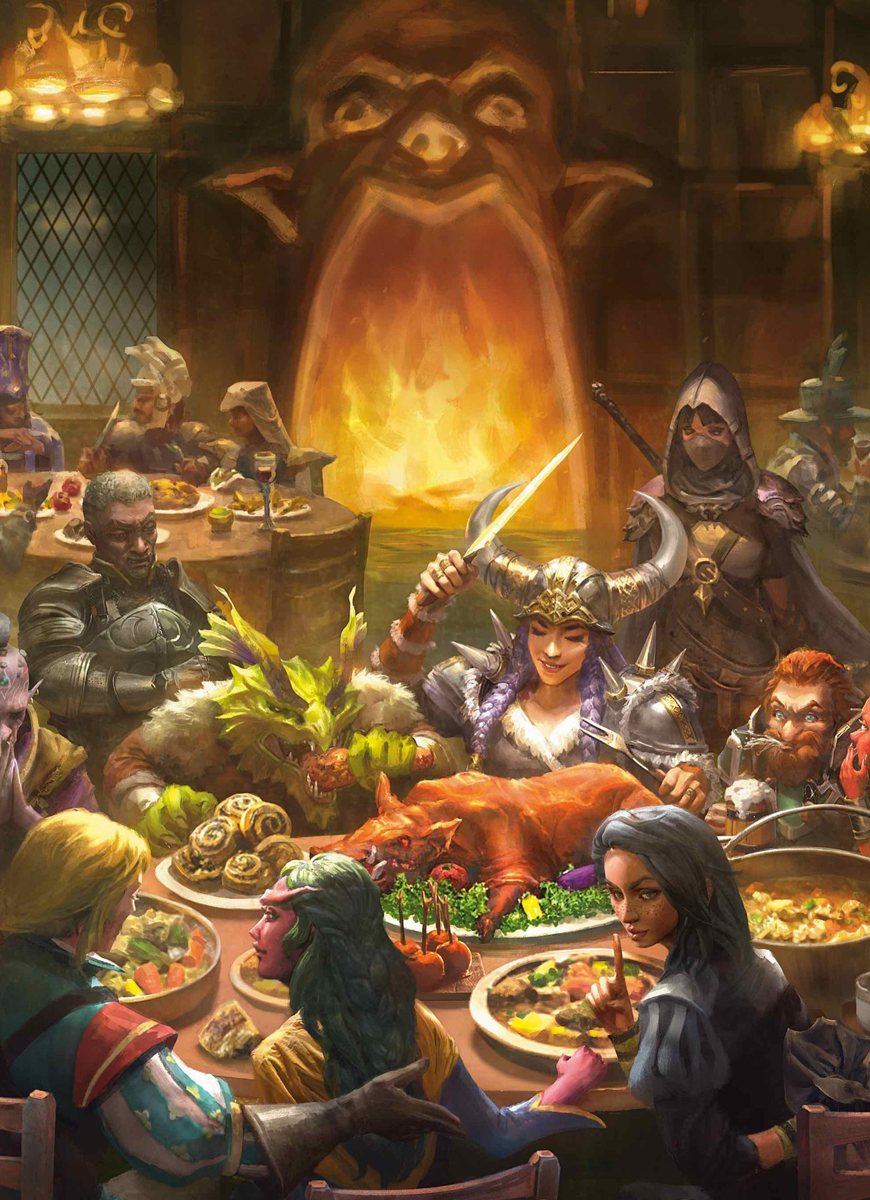
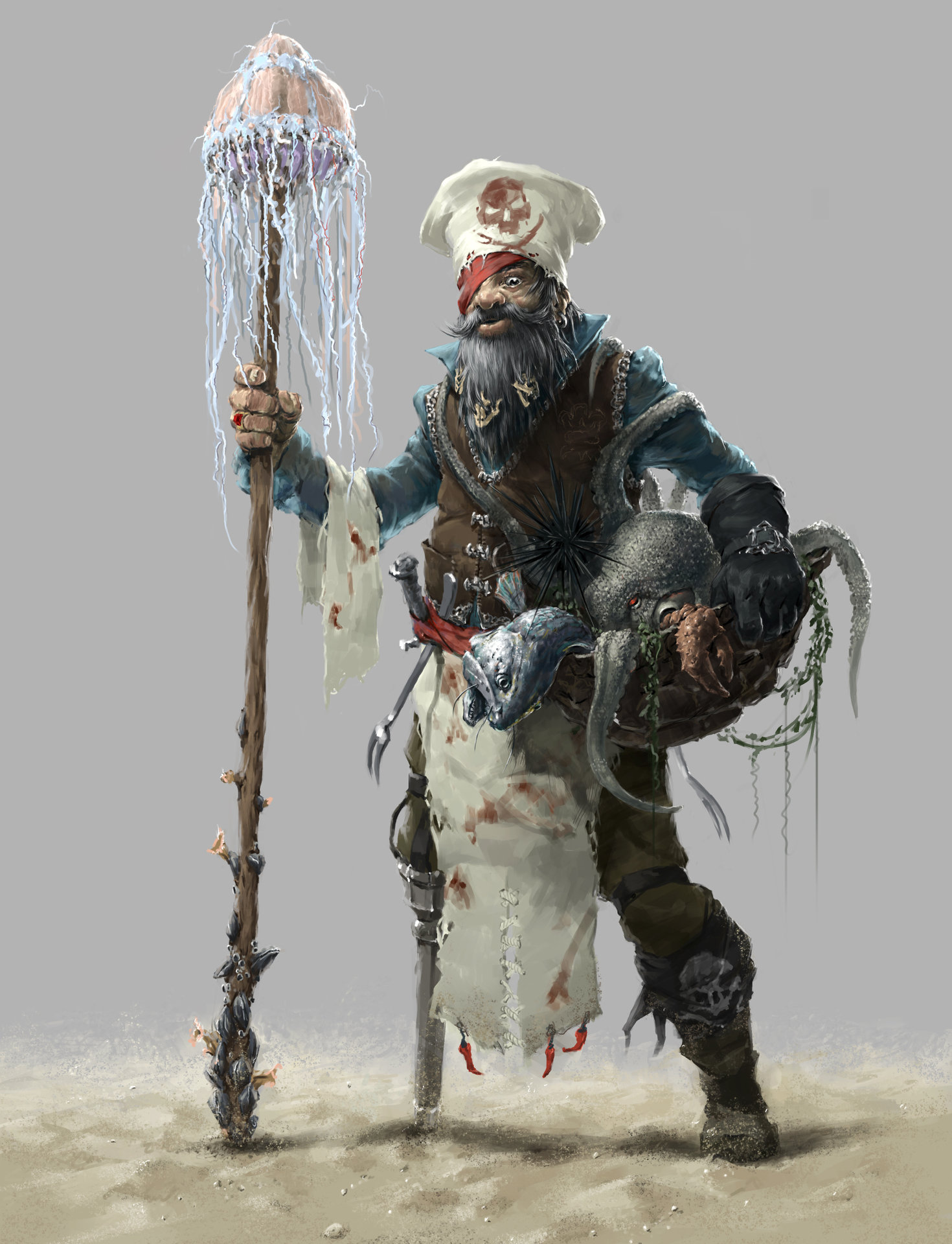






Cook
Having been applied a dwarven spice rub, the dragon meat now sizzles in a bed of aromatic onions, garlic, and handpicked herbs. A young elven cook, with perfect eye and timing, removes the pan’s contents from the dancing campfire flame. Battling against the now cooling meat, she pours a fire elemental stock into the empty pan, stirring and scraping the fond into a sauce. Not only would her companions’ stomachs be filled this night, but their spirits warmed as well. She dishes up her most recent meal: Dwarven-spiced red dragon tenderloin with elemental ash pan sauce and tender aromatic vegetables.
A tired tiefling cook leads the adventuring party to a small clearing to set up camp. Not a word had been spoken since the last battle against the orcs. It was a long, hard day and morale was low. The cook wipes the grime from his face, stirs his own spirit, and gets to work crafting a delicious supper. The campfire warms to life. The fresh crunch of vegetables being chopped echoes out. The tingling scents of immaculate spices begin to dance in the air. Slowly but surely, a discussion is evoked, then an argument, then laughter. The adventurers all take in the meal as well as each others friendship. Sleep is well earned, and the tiefling cook does the dishes with a subtle smile as he takes first watch.
A green liquid vial marked with a red ‘X’ is pulled from the human cook’s pouch. He unscrews the lid, immediately releasing a pungent stink into the air. Slowly and carefully, a single drop of the liquid is added to the boiling stew. No reaction. Good. The King would have just enough time to realize who his killer was before dropping to the floor. All that was required, was to add the perfect mixture of ingredients to hide the pungent aroma.
Combine one-part common chef, one-part adventurer, add a dash of resolve, and you have the unique makings of a hero. The cook brings warm meals and satisfied morale to those around them; making sure all are well-fed, healthy, and empowered to take on the day’s trials.
A Cut Above the Rest
While the profession is not that uncommon, not all cooks are cut out for a life of adventure. Those who decide to take on the evils of the world are brave, resourceful, and adaptable. This kind of cook needs to keep up with the noblest of knights, the cunningest of thieves, and the wisest of wizards, all while carrying a set of heavy pots and pans. On top of the day’s questing needs, a cook needs the extra energy at the end of the day to work over the heat of an improvised kitchen. They then pour their heart and soul into preparing incredible meals that refresh the body and warm the spirit. An adventuring cook’s spirit and work ethic are unmatched.
Not only does the cook work afterhours, but they too work during the adventuring day. They can find their position behind the front line, delivering attacks and aid from a distance. Others dip in and out around their martial professionals, providing aid and resourcefulness at pivotal moments. And even some, with the help of special ingredients, can take their position in the thick of it alongside their allies.
Cook
| Level | Proficiency Bonus | Recipe Slots | Features |
|---|---|---|---|
| 1st | +2 | 1 | Culinary Expertise, adventuring recipes |
| 2nd | +2 | 2 | Sous Chef, Waste Not (1) |
| 3rd | +2 | 3 | Cookbook |
| 4th | +2 | 3 | Ability Score Improvement |
| 5th | +3 | 4 | Monstrous Ingredient (1), Uncommon Cuts |
| 6th | +3 | 4 | Proper Packaging, Waste Not (2) |
| 7th | +3 | 4 | Cookbook Feature |
| 8th | +3 | 5 | Ability Score Improvement |
| 9th | +4 | 5 | Monstrous Ingredient (2) |
| 10th | +4 | 5 | Second Breakfast, Fantastic Cuts, Waste Not (3) |
| 11th | +4 | 5 | Cookbook Feature |
| 12th | +4 | 6 | Ability Score Improvement |
| 13th | +5 | 6 | Test Kitchen |
| 14th | +5 | 6 | Monstrous Ingredient (3) |
| 15th | +5 | 6 | Cookbook Feature |
| 16th | +5 | 7 | Ability Score Improvement |
| 17th | +6 | 7 | Special Occasion |
| 18th | +6 | 7 | Monstrous Ingredient (4) |
| 19th | +6 | 7 | Ability Score Improvement |
| 20th | +6 | 8 | Insightful Tastes |

While not the most revered and well known of the party and will not often take center stage in battle, the cook is a strong backbone to any fellowship on the frontier of adventure. While in some situations they lack the martial or intellectual prowess of other heroes, they posses the moral, mental, and especially, culinary fortitude to last in combat and support their allies.
Tasteful Alchemy
Cooks who take on the life of adventure are still first and foremost, masters of the culinary arts. They are able to field dress slain creatures, gather produce, store foods for lengths of time, and—of course—create delectable meals. To be an adventurer means bringing cooking skills to the front of a fantastic world full of magical and monstrous creatures. Such beings can be the source of very potent ingredients and careful acquisition and masterful skill in using those ingredients may provide benefits beyond a full stomach.
Cooking by itself doesn’t conjure magic but instead can on occasion utilize magical ingredients to great effect; a kind of spiritually warming alchemy. One who knows how to cook with a variety of rare ingredients can provide boons that grant the healing warmth of the heavens, create grotesque transformations of strength, or provide heroes the most restful sleep they’ve ever had. A master cook’s pantry is deep and full of many exotic seasonings.
Creating a Cook
As you create a cook, consider where your cooking skill and culinary acumen comes from. Did you learn long passed down recipes helping your mother cook as she took care of you and your 8 siblings? Perhaps you attended an illustrious culinary college, where chefs competed from around the world to learn the craft. Maybe you were enlisted in the military and became a mess sergeant, helping to feed grand armies and boost morale. Or perhaps you were captured by a roving band of orcs, and instead of being put to death, you were enslaved to cook their seemingly grotesque meals.
Additionally, think about what has driven you to a life of adventure. Do you simply want to make sure the greatest heroes of the realm can do their jobs on a full stomach? Perhaps you seek the glory and achievement of one of the most celebrated chefs in the land? Do you travel the frontier seeking new and experimental ingredients to cook with? Or are you using the simple culinary skills you have to help during a dangerous and tumultuous time?
Quick Build
You can make a cook quickly by
following these suggestions. First,
put your highest ability score in
Constitution, followed by either Strength
or Dexterity, depending on whether you
want to focus on melee or ranged attacks.
Second, choose the folk hero background.
Class Features
As a cook, you gain the following class features.
Hit Points
- Hit Dice: 1d8 per cook level
- Hit Points at 1st Level: 8 + Constitution modifier
- Hit Points at Higher Levels: 1d8 + your Constituion modifier per cook level after 1st.
Proficiencies
- Armor: Light armor, medium armor
- Weapons: Simple melee weapons
- Tools: Cook's utensils
- Saving Throws: Constitution, Intelligence
- Skills: Choose three skills from Athletics, Animal Handling, Deception, History, Insight, Intimidation, Investigation, Medicine, Nature, Performance, Persuasion, Survival, and Sleight of Hand.
Equipment
You start with the following equipment, in addition to the equipment granted by your background:
- (a) scale mail or (b) leather armor
- any simple melee weapon
- cook's utensils
- a component pouch
- (a) a dungeoneer's pack or (b) an explorer's pack
- 10 flasks, 10 sacks, 10 feet of string, an iron pot, and 3 small knives.
Multiclassing
Rules for multiclassing with the cook class can be found in appendix B.
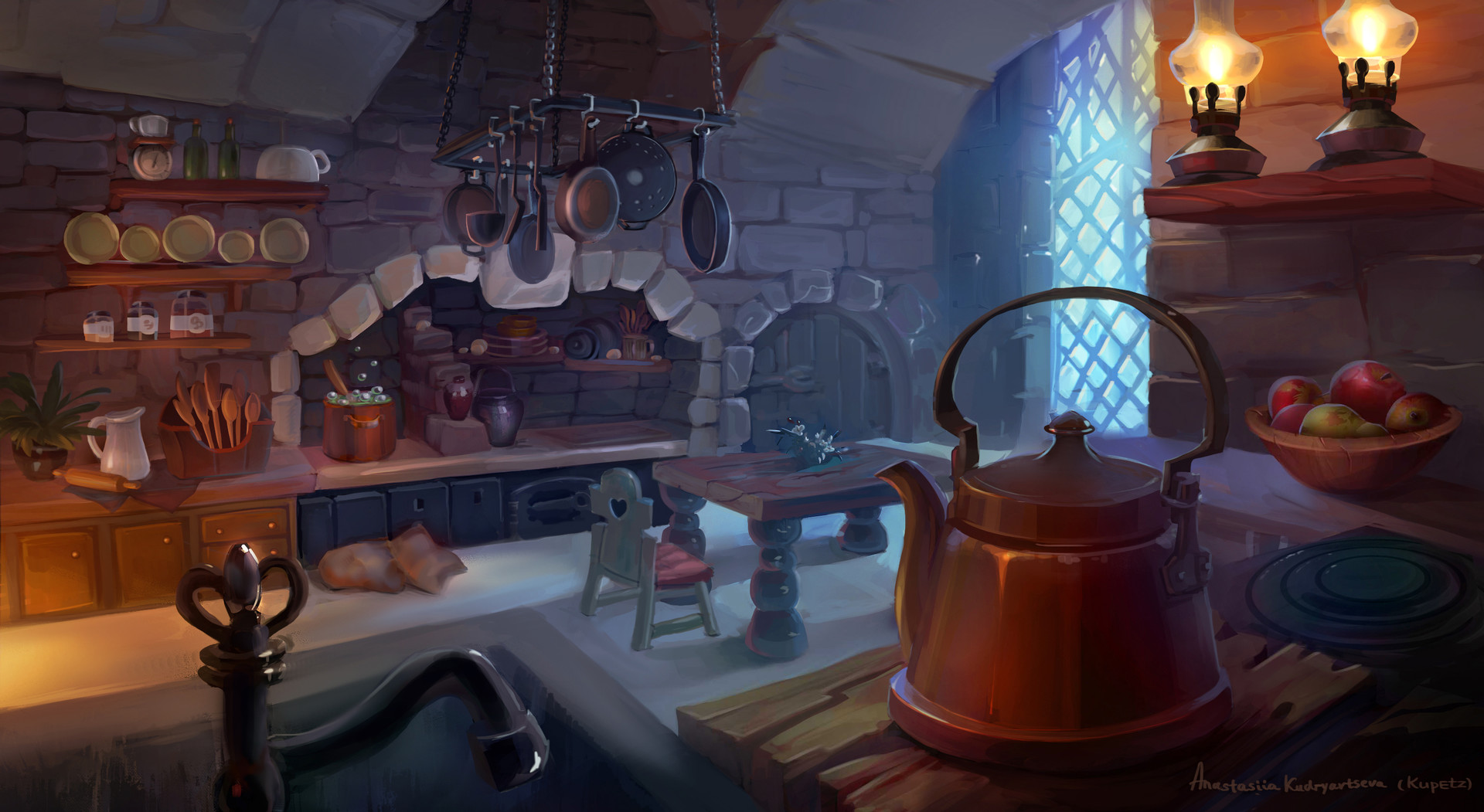








Culinary Expertise
The first thing you bring to a life of adventure is your cooking skill. Your proficiency bonus is doubled for any ability check you make that uses your proficiency with cook’s utensils.
Additionally, you come with or quickly adopt a particular style of weapon proficiencies in order to survive. Choose one Culinary Expertise from the below options.
Fish Food
Some of your favourite dishes come from fresh fish or crustaceans and in order to come by ingredients while adventuring you have become skilled at spear fishing. You are proficient with pikes and nets.
If your character is 1st level when you gain this feature, you may add a pike and a net to your starting equipment.
Hunter-Gatherer
You hunt your own supply of animal meat while adventuring and have become skilled attacking from a distance. You are proficient with simple ranged weapons.
If your character is 1st level when you gain this feature, you may add a short bow or light crossbow (with 20 arrows or bolts), and a hunting trap to your starting equipment.
Large Portions
One of the cooking utensils used in your craft is an irregular, oversized, strongly built, two-handed version of its more common form. This might be a 20” cast iron pan, a long iron ladle, an oversized tenderizing mallet, or a magnificently huge cleaver. You are proficient with mauls and greatswords and this large cooking utensil is an improvised weapon that you are proficient with. The utensil either does 2d6 bludgeoning damage or 2d6 slashing damage on a hit, depending on if it's blunt or bladed.
If your character is 1st level when you gain this feature, you may add this oversized cooking utensil to your starting equipment.
Pan-Handler
Your cooking style involves a lot of sautéing and frying and a sturdy, well made pan is central to your craft. You gain proficiency with shields. Additionally, you can use a large pan, wok, or similar cooking surface as an improvised shield that you are proficient with. When this improvised shield is equipped, you gain a +2 AC bonus.
If your character is 1st level when you gain this feature, you may add a large sturdy pan, wok, or similar cooking utensil to your starting equipment.
adventuring recipes
As a cook on the frontier of danger, you have taken it upon yourself to explore rare cookbooks, experiment with fantastic ingredients, improvise around the campfire, and learn special techniques in order to prepare unique kinds of recipes known as adventuring recipes. These recipes represent tasks the cook can focus on during a rest and can take the form of a serving of food, preparation for the day to come, or even building bonds with your fellow travellers.
See the adventuring recipe section at the end of this class for the various recipe lists and adventuring recipes. You will have many opportunities to grow your known adventuring recipes from these listings as you grow as a cook.
Fresh Ingredients
Before a cook can prepare adventuring recipes, they need a source of ingredients, known as fresh ingredients. You may acquire fresh ingredients by (a) taking 10 minutes to field dress a beast or plant type creature of size small or larger that has been dead for less than 4 hours, (b) successfully foraging or fishing for food if sufficient sources are in the area (DC to be set by the DM), (c) spending at least 5sp at a food market where fresh ingredients are available, (d) raiding a source of well-stocked food stores that already contain fresh ingredients, or (e) any other scenario you and the DM can come up with where the result is fresh ingredients.
Ingredient Die. When you gather fresh ingredients, you gain the Ingredient Die, a d4, of which you can only ever have one of. After using fresh ingredients to prepare adventuring recipes, roll your Ingredient Die to determine if you have any fresh ingredients remaining. On a result of 1 or 2, your food stores have either been used up, have spoiled, or there’s not enough remaining to create a meaningful meal. You lose your Ingredient Die, and will have to gather fresh ingredients again.
Variant Rule: Fresh Ingredients
If you'd rather not be concerned with gathering fresh ingredients, see appendix B for a variant rule.
Preparing Adventuring Recipes
The cook table shows you how many recipe slots you have to prepare adventuring recipes. Once during a long or short rest, you can choose, prepare, and serve a number of known recipes equal to your number of recipe slots. You require a number of resources to create your recipes: a set of cook’s utensils, a component pouch to supply simple ingredients (salt, pepper, spices, etc.), an hour of time, a source of heat, and fresh ingredients.
The recipes chosen to prepare can be all the same recipe, all different recipes, or any combination, as long as they come from your known adventuring recipes. When you prepare your adventuring recipes, you use your equipment and fresh ingredients to create the servings or perform the action associated with the adventuring recipes chosen. After you've created your servings, roll the ingredient die to determine if you have fresh ingredients remaining.
Unless otherwise stated, the servings produced by adventuring recipes and their effects expire the next time you use fresh ingredients.
Saving Throws
Some recipes and features require your target to make a saving throw to resist the cook’s recipe effects. The saving throw DC is calculated as follows:
Recipe Save DC







Starting Recipe
Anyone proficient with cook’s utensils
can prepare a meal. Your meals however
are a little more creative, restorative, and
energizing. A slow roasted boar flank with
perfect seasoning, a fresh and filling myconid
salad, or a pound of dragon hot wings with just
enough heat. These are just a few of the forms
taken by the cook’s first known recipe, the
Hearty Meal adventuring recipe. This recipe can
be found at the end of the class.
Sous Chef
Beginning at 2nd level, just like in the kitchen, you
learn how to come to the aid of other professionals around you and know exactly when to get out of their way. After you take the Help action to aid an ally in attacking a target, you can use your bonus action to take the Disengage action.
Waste Not
Being a cunning and resourceful cook means utilizing your downtime and ingredients efficiently in order to prepare for your adventuring day. When you reach 2nd level, choose one recipe from the waste-not recipe list and add it to your known recipes.
The number of known waste-not recipes increases at higher levels. Choose an additional waste-not recipe and add it to your known recipes at 6th and 10th level.
At the beginning of a long rest, you can replace one waste-not adventuring recipe that you know with another from the waste-not recipe list.
Containers as Ammunition
Many of the cook’s recipes result in storing the serving in a flask, sack, or other kind of container. Tracking procurement and usage of these is up to the DM and players. This kind of ‘ammunition’ should be treated similar to other types of ammunition, like arrows or bolts.
Cookbook
At 3rd level, you subscribe to a form of culinary lifestyle to carry you as a cook. You can choose the Cookbook of the Well-Seasoned or the Cookbook of the Unsavory. Your choice grants you features at 3rd level and again at 7th, 11th, and 15th level.
Ability Score Improvement
When you reach 4th level, and again at 8th, 12th, 16th, and 19th level, you can increase one ability score of your choice by 2, or you can increase two ability scores of your choice by 1.
As normal, you can’t increase an ability score above 20 using this feature.
Additionally, if you’d like to shift your culinary focus, when you reach a level in this class that grants this Ability Score Improvement feature you can either replace a culinary expertise or monstrous ingredient you know with another from the same list.
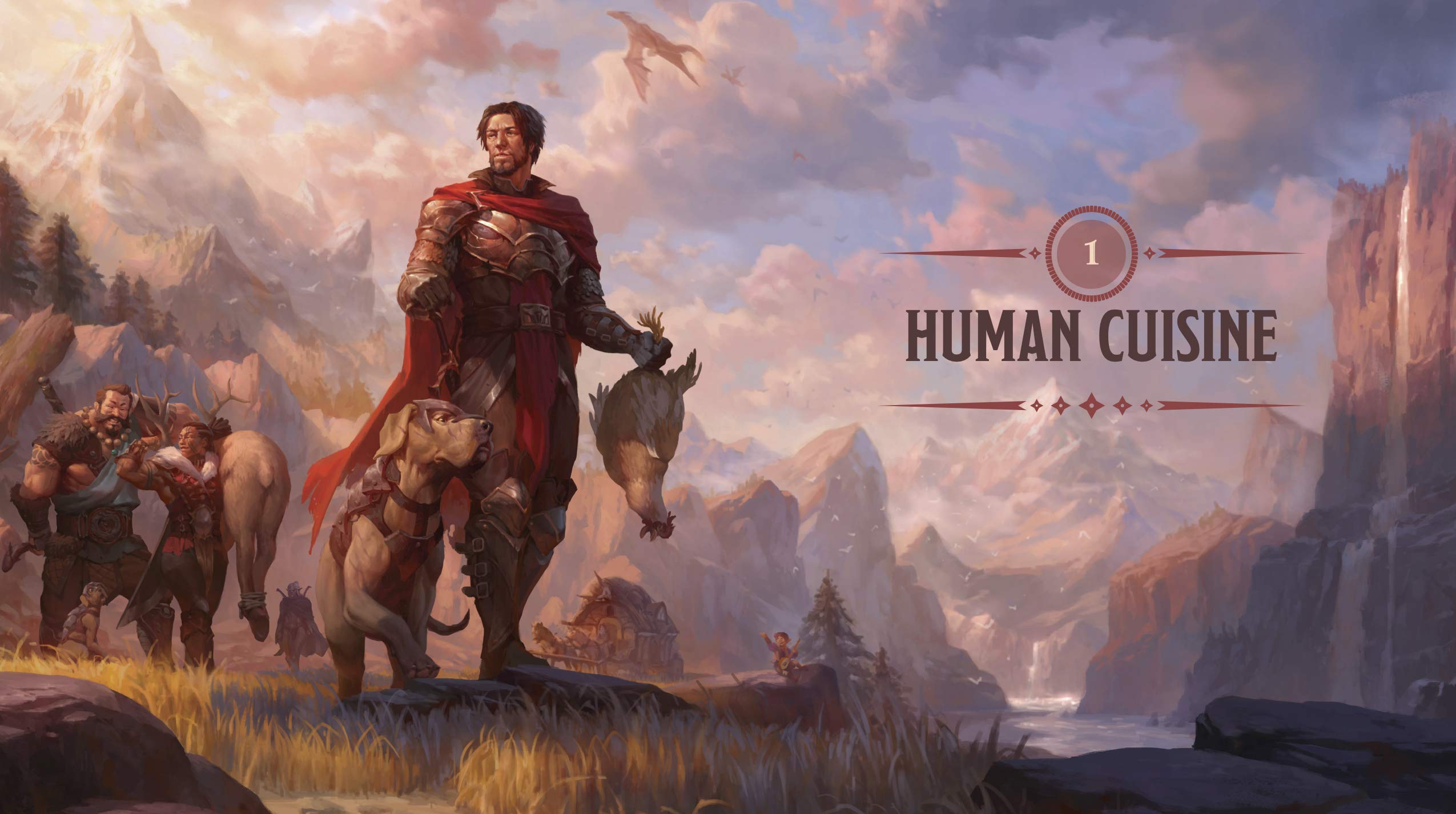















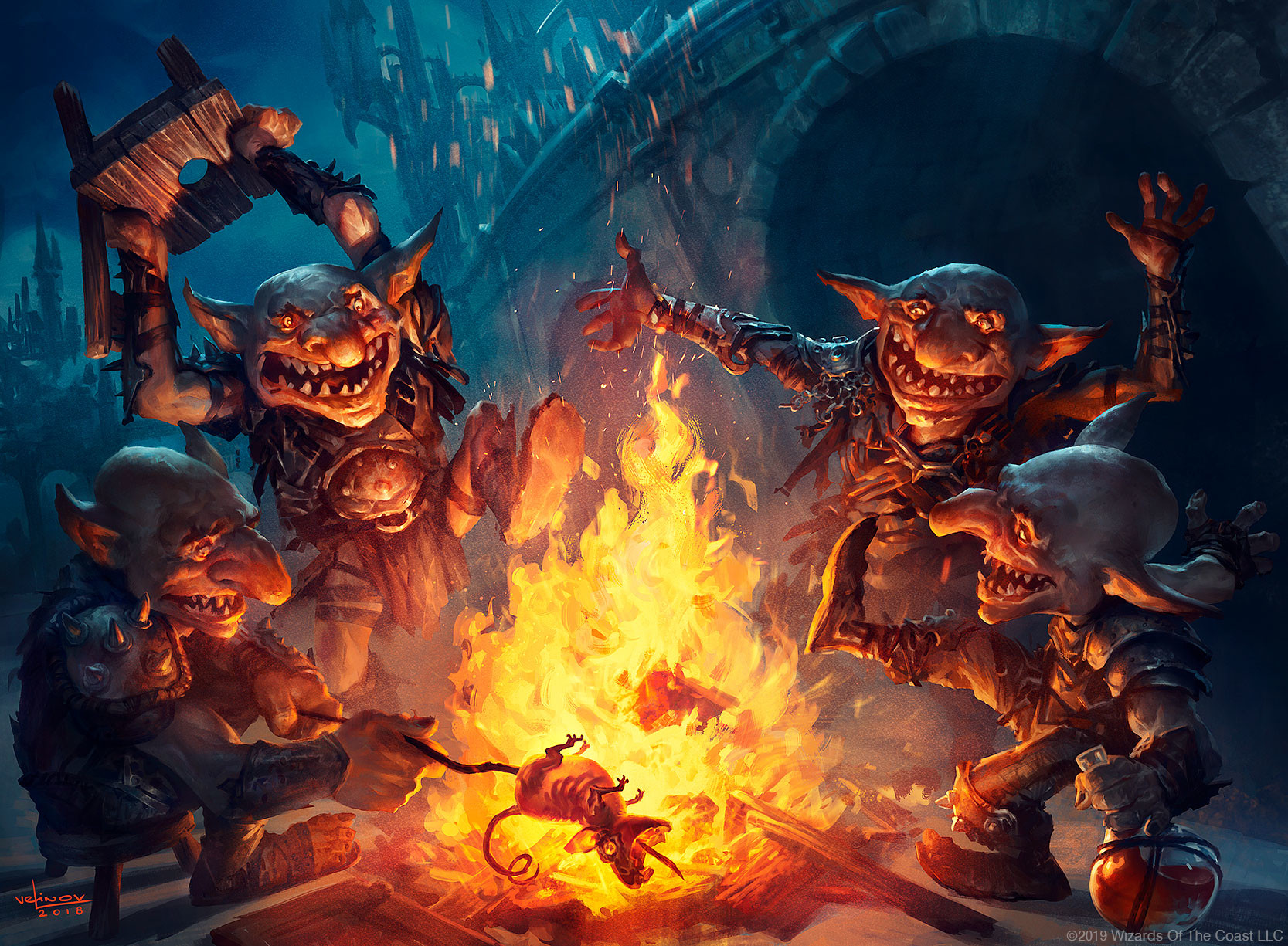
Monstrous Ingredients
By 5th level, adventuring has provided you with opportunities to extract, study, and skillfully utilize rare ingredients from creatures of the world. When mastered and included in your cooking, they can impart benefits to those who consume or utilize them that are potentially supernatural or magical.
You choose to specialize in ingredients and techniques specific to a type of monster. Choose a monster type from the Monstrous Ingredients list at the end of this base class. You are specialized at working with ingredients of that monster type: minor ingredients (examples of ingredients you can use to creatively flavour your meals) and also a rarer major ingredient, which provide special benefits. Once you specialize in a monster type, you keep a supply of it's major ingredient on hand, and it is automatically available to include in your cooking from your component pouch.
You add one monstrous ingredient choice to your repertoire at 5th level, and again at 9th, 14th, and 18th level.
Uncommon Cuts
Additionally, at 5th level, you have learned to safely and skillfully gather, prepare, and cook ingredients from monsters of the material plane. You can gather fresh ingredients from the remains of dragon, giant, monstrosity, ooze, and undead type creatures if they are size small or larger and have been dead for less than 4 hours.
Flavour of Monster Ingredients
Choosing a type of monster ingredient to specialize in can be more than simply choosing an ingredient as working with them may impart flavourful changes.
For example, working with ooze ingredients may cause constant sliminess, aberration ingredients may cause absentmindedness or addiction, undead ingredients may cause extremely dry skin and hair, and dragon ingredients may cause singed eyebrows and clothing.
Proper Packaging
Beginning at 6th level, you have learned improved methods for ingredient storage, providing longer shelf life and a more efficient use of space. When you use fresh ingredients and roll the Ingredient Die, your food stores now only run out or expire when a 1 is rolled.
Additionally, improving your storage methods effectively allows you to carry more. Your carrying capacity is now your Strength score multiplied by 20, instead of 15.










Second Breakfast
At 10th level, your cooking skills are further improved. The leftovers produced by your Hearty Meal adventuring recipe now restore 2d4 hit points.
Fantastic Cuts
By either extensive study or extraordinary practice, at 10th level you have learned to safely and skillfully gather, prepare, and cook ingredients from monsters of other Planes of Existence. You can gather fresh ingredients from the remains of aberration, celestial, elemental, fey, and fiend type creatures if they are size small or larger and have been dead for less than 4 hours.
Test Kitchen
At 13th level, eating experimental foods over time has provided you with the ability to consume any number of normally detestable, and potentially dangerous foods. You can no longer become poisoned or diseased through ingestion or inhalation.
Special Occasion
At 17th level, you always have a little something stashed away for special occasions. When you roll initiative, you can instantly create the servings of any known adventuring recipe. You can use this feature once and it recharges at the end of a long rest.
Insightful Tastes
At 20th level, you are an extremely experienced cook and can discern a patron’s exact mental, physical, and spiritual nutritional needs just by looking at them.
Your Hearty Meal adventuring recipe now provides a +2 bonus to any single ability score, chosen by the creature consuming the serving. This feature can increase the ability score above 20.
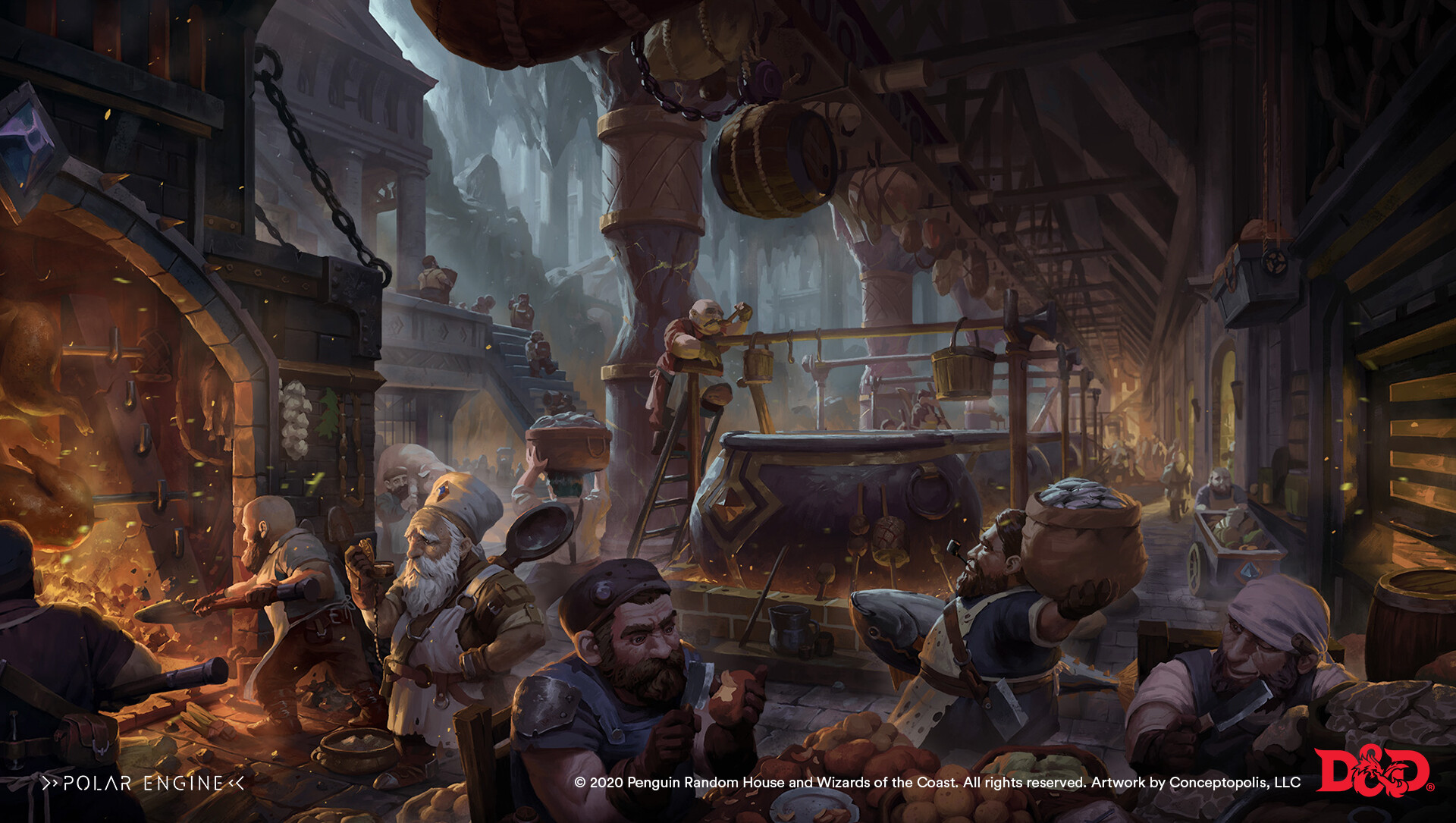











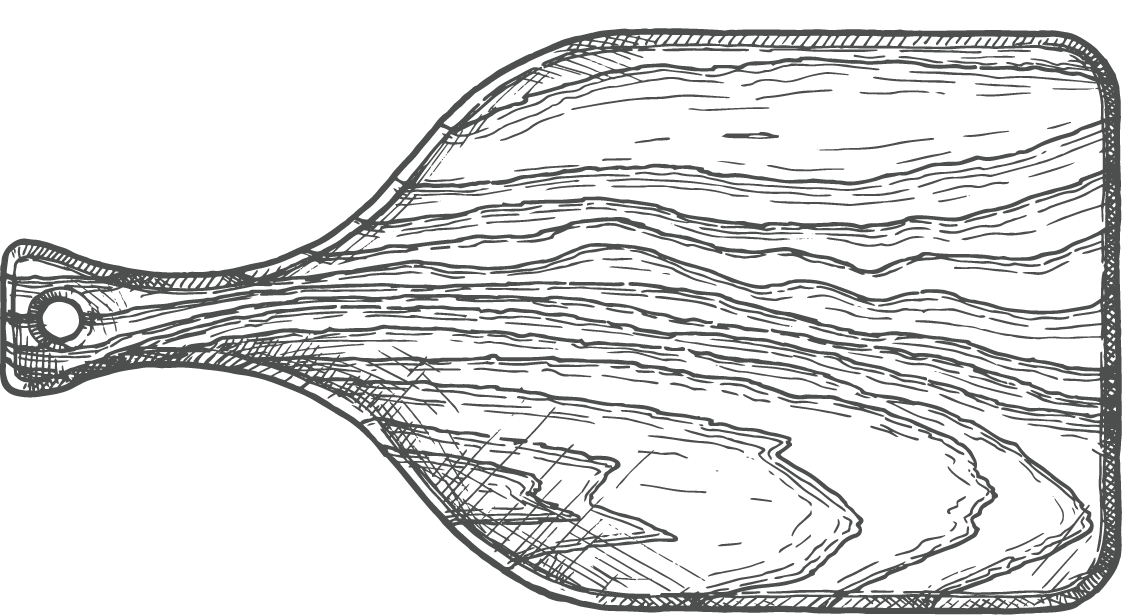

Monstrous Ingredients
The following Monstrous Ingredients are listed in alphabetical order by monster type:
10 Year Wine of Zurragh
You choose to specialize in ingredients gathered from aberration type creatures. Minor ingredients used might be beholder eye stock, nothic ocular fluid, or flumph spray. The major ingredient you learn to prepare is the 10 Year Wine of Zurragh. This wine, produced by a cult dedicated to an obscure dark lord, is a many year fermentation of the juices squeezed from an aboleth’s frontal lobe. It is less of an ingredient and more of a cooking aid. Continued exposure to the aroma and gentle sips of the wine imbibes the cook with a mildly expanded focus during strenuous prep work.
When preparing adventuring recipes during a long or short rest, you can prepare double the servings of any one of the prepared recipes.
The Light's Oil
You choose to specialize in ingredients gathered from celestial type creatures. Minor ingredients used might be holy water, muddled couatl scales, or pegasus tenderloin. The major ingredient you learn to prepare is The Light’s Oil. This solution is a single unicorn hair suspended in a mixture of vegetable oil and holy water. The clear bottle naturally gives off dim light in a 5-foot radius. The gods don’t appreciate using one of the most sacred creatures in this way, so the difficulty in crafting with this ingredient is the precise incantations that must be chanted during food prep. This solution, when combined into a vinaigrette, allows you to make the Light Salad Roll adventuring recipe.
Animated Smelling Salts
You choose to specialize in ingredients gathered from construct type creatures. Minor ingredients used might be previously enchanted metal chassis filings, reused stitches, or a recycled yew cutting board. The major ingredient you learn to prepare is Animated Smelling Salts. These salts are created from grinding down various arcane remnants of old retired wizard golems. The mineral salts are specially stored in a small tin and when carefully exposed to a creature can impart restorative effects.
As an action, the smelling salts can be administered by the cook to a creature within 5 feet. Smelling the salts restores a number of hit points equal to the cooks proficiency bonus. When the creature gains these hit points, it can immediately use its reaction to move up to its speed, without provoking opportunity attacks. Additionally, the first weapon attack the creatures makes on their next turn is done so with advantage.
The smelling salts have three uses, and those uses recharge at the end of a long rest.
'Dragons in Heat' Hot Sauce
You choose to specialize in ingredients gathered from dragon type creatures. Minor ingredients used might be pseudodragon eggs, faerie dragon dust, or drake steaks. The major ingredient you learn to cook with is ‘Dragons in Heat’ Hot Sauce. This hot sauce is specially derived from the saliva secreted by a Red Dragon’s pyrophoric glands. The ingredient naturally gives off an intense heat and takes special precautions when handled to not be burned. Contact with the hot sauce directly, without being expertly cooked into food, incurs 1 fire damage. This hot sauce allows you to make the Spitfire Chili adventuring recipe.
Distilled Water Elemental
You choose to specialize in ingredients gathered from elemental type creatures. Minor ingredients used might be chwinga legs, fire snake eggs, or ice mephit cubes. The major ingredient you learn to work with is Distilled Water Elemental. This flask of seemingly normal water is extremely cold (below freezing and yet still a liquid) and is typically used to chill milk or cream into cold deserts. Additionally, you learn the Ele-mint Lozenge adventuring recipe.
Pixieweed Seeds
You choose to specialize in ingredients gathered from fey type creatures. Minor ingredients used might be dryad’s home planks, satyr’s ambition spice blend, or sea hag sauce. The major ingredient you learn to prepare is Pixieweed Seeds. These enchanted seeds from the Feywild are harvested from plants nourished by pixie dust that has fallen to the ground. Handling of the seeds must be done carefully as they can grow nearly anywhere in a matter of seconds. Once planted, a vine erupts and instantly grows to a size of 5 feet tall, producing a number of vibrantly colorful leaves, fruits, and vegetables; enough to provide the cook with fresh ingredients. Once all the produce is picked, the vine then intensely turns grey, rots, shrivels, and dies.
Alternatively, a seed can be thrown 10 feet at a target creature as an improvised ranged weapon. On a miss, the seed plants itself normally, 5 feet from the target. On a hit, the seed embeds itself into the creature, using it as a source of food. The vine erupts on the target doing a number of d10 necrotic damage equal to your proficiency bonus. If the target is large or smaller, they must then make a DC 12 Strength Saving throw or be restrained. While restrained by the vine, the target takes 1d10 necrotic damage at the end of its turn. The vine can be broken off with a DC 12 Strength (Athletics) check and it can also be attacked, having 10 AC and 20 hit points. If torn or cut off, the vine dies but leaves its produce behind.
The seeds have one use, which recharges at the beginning of a long rest.
Salty Succubus Tears
You choose to specialize in ingredients gathered from fiend type creatures. Minor ingredients used might be abyssal chicken eggs, Phlegethos peppercorns, or neutralized imp’s poison. The major ingredient you learn to cook with are Salty Succubus Tears. Through intense emotional cultivation practices, the tears of a succubus are collected and bottled for purchase in specialty shops, often used as a mild aphrodisiac. These tears allow you to make the Entrancing Entrée adventuring recipe.
Hill Giant’s ‘Sleepy Time’ Tea
You choose to specialize in ingredients gathered from giant type creatures. Minor ingredients used might be ettin eye sleep spice, troll’s blood, or half-ogre’s placenta. The major ingredient you learn to prepare is the Hill Giant’s ‘Sleepy Time’ Tea. This calming, musky tea blend is created from a mixture of Hill Giant’s hair, toenails, and dried pituitary gland. You know the Hill Giant’s ‘Sleepy Time’ Tea adventuring recipe.
Monster's Jam
You choose to specialize in ingredients gathered from monstrosity type creatures. Minor ingredients used might be scaled cockatrice eggs, crushed harpy vocal cords, or minotaur brisket. The major ingredient you learn to prepare is Monster’s Jam. Wizards of the world are constantly running experiments on a wide variety of monsters. This ingredient is a mixture of leftover enchanted monster parts from many kinds of those creatures, grounded up, and slightly sweetened with gelatin. This jam allows you to prepare the Grotesque Fruitcake adventuring recipe.
Aged Ochrefort Cheddar
You choose to specialize in ingredients gathered from ooze type creatures. Minor ingredients used might be dried gelatinous noodles, ‘oblex memories’ spice, or ooze-cured meat. The major ingredient you learn to cook with is Aged Ochrefort Cheddar. This ripe cheese derived from specially cultured ooze is added in various ways to your cooking including sliced and grated. Continued use of this ooze ingredient works as a diuretic, builds a healthy, well-lubricating gut culture, and promotes regularity. This translates to feeling less heavy during the adventuring day.
All adventurers of whom the cook considers its fellow party members (and therefore eat the cook’s food regularly) gain a +1 bonus to initiative and a 5-foot bonus to their speed.
The initiative and movement bonus increase to +2 and 10 feet at 14th level.
Well-Preserving Dust
You choose to specialize in ingredients gathered from undead type creatures. Minor ingredients used might be animated bone stock, revived steaks, or ectoplasmic goo. The major ingredient you learn to cook with is Well-Preserving Dust. This musty and extremely dry powder is made from the remnants of a sun-baked vampire spawn.
Before your servings are due to expire (typically when you use fresh ingredients again), this dust can be sprinkled onto up to three servings. Each serving skips that expiry time and instead will expire the next time the serving is due to expire. You can of course apply the Well-Preserving Dust repeatedly at each expiry, effectively extending the life of a serving indefinitely.
Cookbooks
As a cook becomes more accustomed to a life of adventure, they decide to subscribe to a cookbook. This cookbook is less a physical list of recipes and more a lifestyle guide, setting out a set of “morale ingredients” for success in the world.
Cookbook of the Well-Seasoned
Subscribing to the Cookbook of the Well-Seasoned is ultimately about bringing adventurers together at the end of the day through your cooking. Your food is a vessel for togetherness, comradery, and shared experiences. When the swords are sheathed, the armor is doffed, and a great meal is shared, true friendships are forged. It's through these gatherings that the cook himself grows a little bit every time. He absorbs and learns stories, skills, and knowledge whenever he shares a cookfire with the many differing people of the land. Indeed, it is through connections with people that the cook truly becomes well seasoned.
Cookfire Comradery
When you choose this cookbook at 3rd level, you begin to excel at drawing people into the warmth and comradery of a meal after shared experiences. You learn the Cookfire Comradery adventuring recipe, which is less a recipe about bringing ingredients together, but instead people.
The Spice of Life
At 3rd level, through many discussions, stories, and lectures among adventurers around the fire at night, you’ve learned small bits of information on a great deal of things. You can add half your proficiency bonus, rounded down, to any ability check you make that does not already include your proficiency bonus.
Extra Attack
Beginning at 7th level, you have honed your combat skills over time by taking some lessons from your travelling companions. You can attack twice, instead of once, whenever you take the Attack action on your turn.
Additionally, any of the actionable objects created by your want-not recipes may be used as one of the attacks when taking the Attack action.
Shop Talk
At 11th level, you've cooked for a vast variety of skillful and magical heroes and have managed to peice together full skills from numerous discussions and observations. You can do one of the following:
- (a) choose two of your skill proficiencies,
- (b) choose two cantrips from the wizard spell list,
- (c) or choose one of your skill proficiencies and one cantrip from the wizard spell list.
Your proficiency bonus is now doubled for any ability check you make that uses the chosen skill proficiencies. The chosen cantrips are learned and Intelligence is your spellcasting ability for them.
Wayfarer's Education
You've traveled and shared stories with many people. Some you might still know and some might be long lost. You can take time to study and recall lessons from some of the more noteworthy travelers you've shared your cookfire with. You learn the Wayfarer's Education adventuring recipe.
Cookbook of the Unsavory
From the unassuming line cook to the new assistant of the King’s personal chef; none are afraid of using their knowledge and skills with food, as well as some black-market ingredients, to get the job done. While not for everyone, those who subscribe to the Cookbook of the Unsavory turn their food into more destructive and deadly forms of expression.
Bonus Proficiencies
When you choose this archetype at 3rd level, you gain proficiency in the Deception skill and the poisoner’s kit. If you were already proficient in Deception, you can choose another skill from the cook’s class features to become proficient in.
Additionally, you can double your proficiency bonus for any checks using your Deception skill to conceal a serving’s deadly or poisonous effects from the creature consuming it.
Feeding Victims
Some of the cook’s recipes are unlikely to be eaten if the target knows their adverse or deadly effects. In these cases, the cook can attempt to hide the effects of his cooking. Use a contest between the cook’s Deception vs the victim’s Passive or Active Perception. If the victim notices something fishy about their meal, by smell or by taste, they likely won’t be dining.
Crying Dragon Soup
After experimentation with a number of illicit ingredients at 3rd level, you learn to acquire and cook with dragon’s tears. These tears are difficult to cook with and usually relegated to serving as a fuel for lanterns. As an ingredient, the tears are dangerous if prepared incorrectly but especially dangerous if prepared to perfection. You learn the Crying Dragon Soup adventuring recipe, which contains a healthy dose of the tears hidden within.
Finger Food
At 7th level, you have become skilled and--more importantly--bold enough to gather ingredients from an array of taboo sources. For any slain creature you can already gather fresh ingredients from, you can now gather fresh ingredients from it if has been dead for less than 24 hours. You can also gather fresh ingredients from the remains of humanoid type creatures if they are size small or larger.
Soup of the Day
At 7th level your dragon’s tears usage expands to include different colours of dragons. When you prepare your Crying Dragon Soup adventuring recipe, you can choose to make it from black, blue, red, or white dragon’s tears. When you do so, the poison damage of the servings change to reflect that of the chosen dragon type.
Dragon's Tears Table
| Dragon Colour | Damage Type |
|---|---|
| Black | Acid |
| Blue | Lightning |
| Green | Poison |
| Red | Fire |
| White | Cold |
Sweetened black pudding
At 11th level, through further acquisition of illicit means, you come into the possession of more ingredients not normally fit for consumption. The finest of these is a dehydrated dark ooze reduction, allowing you to prepare the Sweetened Black Pudding adventuring recipe.
Forbidden Ingredients
At 15th level, you’ve managed to track down certain ingredients in the world that require great skill to cook with and whose effects can be disastrous in the wrong hands. Improper use of them in the past has resulted in the destruction of single lives and entire civilizations. Therefore, these ingredients were deemed forbidden for the use of cooking. Using any of these ingredients costs 1000gp per recipe, which is spent when the servings are created.
Forbidden recipes are a special subclass of adventuring recipes. You learn and know all listed adventuring recipes in the forbidden recipe list. Once prepared, the servings created by forbidden recipes are magically stored and last indefinitely, until consumed or destroyed.
While you are carrying the servings associated with a forbidden recipe, you cannot create another and the number of recipe slots during a long or short rest is decreased by one. Maintaining the forbidden serving--keeping them secret and safe--are effectively taking focus away from your regular cooking.
On Cannibalism
First, the usage of the humanoid aspect of Finger Food feature should be discussed ahead of time with your fellow players. Some players may be uncomfortable with turning their characters into cannibals. If optioned, that portion of the Finger Foods feature can be ignored.
Secondly, if the players are OK with the feature, in-game characters may not be. This might lead to the cook secretly harvesting humanoids for fresh ingredients and might require a Stealth or Deception check to hide these actions from the other party members. The DM controls any DC values for these checks or contests. However, these acts can lead to some in-party contention, so be sure the group is alright with this ahead of time.
adventuring recipes
Core Recipes
- Hearty Meal
Forbidden Recipes
- Pull-Apart Lobe Loaf
- Unicorn-Frosted Cupcake
- Lonely Vampire's Dinner for Two
Monstrous Recipes
- Ele-mint Lozenge
- Entrancing Entrée
- Grotesque Fruitcake
- Hill Giant's 'Sleepy Time' Tea
- Light Salad Roll
- Spitfire Chili
Well-Seasoned Recipes
- Cookfire Comradery
- Wayfarer's Education
Unsavory Recipes
- Crying Dragon Soup
- Sweetened Black Pudding
Waste-Not Recipes
- Burning Brine
- Crackle Satchel
- Grease Fire
- Pepper Powder
- Rancid Sack
- Smoke Bomb
- Sticky Pitch
Burning Brine
You prepare a thick solution made of salt, oil, and water. As an action, a creature can use a free hand to apply the solution to one slashing or piercing weapon or up to three pieces of ammunition. A creature hit by the salted weapon or ammunition takes 1 additional damage. If the creature taking damage is an undead or fiend, it takes 2 additional damage instead. Once applied, the solution retains potency for 1 minute.
Cookfire Comradery
Your cooking draws party members into the companionship around the cookfire, inspiring them to aid each other during the adventuring day. When you prepare this recipe, you gain a number of d6s, known as comradery dice, equal to your Constitution modifier (minimum of one). You can distribute the comradery dice amongst your travelling companions (including yourself) as you see fit, as long as they can speak one language. The dice are lost when spent or when the cook uses fresh ingredients again.
Your comradery dice change once you reach certain levels in this class. The dice become d8s at 7th level, d10s at 11th level, and d12s at 15th level.
The comradery dice can be spent in the following ways:
Coordinate. A character can spend their comradery die to perform the Help action as a bonus action. If the character is aiding an ally in attacking a creature, that target can be up to 30 feet away from the character. On a hit, the comradery die is added to the damage of the attack.
Rouse. When a character attempts to stabilize a dying creature, they can spend their comradery die and add it to their Wisdom (Medicine) check. The comradery die must be spent before the check is made. If the check succeeds without adding the comradery die, the stabilized creature regains 1 hit point.
Believe. If a character fails a Constitution saving throw to maintain concentration, an ally within 15 feet can use their reaction and spend their comradery die, adding it to the saving throw.
Crackle Satchel
Using a number of small sharp bones, pointy sticks, old egg shells, and dried plants leftover from previous meals, you organize them into small sacks, ready to quickly deploy. As an action, you can spread the contents of the satchel to cover a 5-foot-square area. Any creature that enters the area must succeed on a Dexterity saving throw vs the cook’s recipe save DC or stop moving this turn and take 1 piercing damage. A creature moving through the area at half speed doesn't need to make the save. When the contents of the satchel are stepped on, a crackling and crunching noise can be heard up to 100 feet.
Crying Dragon Soup
You create a number of servings of a spicy and unstable soup from the tears of an adult green dragon, serving it up in a flask. As an action, the flask can be thrown at a point up to 20 feet away, breaking and violently vaporizing into a small explosion over a 5-foot radius area. Any creatures in the area must make a Dexterity saving throw vs the cook’s recipe save DC. A target takes 2d8 poison damage on a failed save, and half as much damage on a successful one.
Alternatively, if the serving is ingested, the damage doesn’t occur until 5 minutes after the soup is swallowed and the creature consuming must make a Constitution saving throw vs the cook’s recipe save DC. A creature takes 3d8 poison damage on a failed save, and half as much damage on a successful one. If the total damage would kill the creature, the stomach of the creature becomes a powder keg and erupts, doing 1d8 poison damage in a 10-foot radius area.
The damage of this recipe increases by 1d8 at 7th level, 2d8 at 11th level, 3d8 at 15th level, and 4d8 at 19th level.
Ele-mint Lozenge
These tasty and chilling lozenges can be placed into the mouth of a creature (including yourself) as a bonus action. Besides clearing up any congestion, the serving provides additional benefits. The initial breath taken after ingesting the lozenge is extremely cold and must be expelled as part of the bonus action. This cold breath can be expelled along the length of a weapon or up to 10 pieces of ammunition as long as either is within 5 feet. For 1 minute, the weapon or ammunition does an additional d6 cold damage on a hit and reduces the targets speed by 10 feet until the end of its next turn.
Entrancing Entrée
You prepare an intensely savory meal by utilizing a marinade made from Salty Succubus Tears. When consumed by a creature over 5 minutes, that creature must make a Constitution saving throw vs the cook’s recipe save DC. On a failure, the creature is magically charmed by you for 1 hour or until you or your companions do anything harmful to it. Once that time is up, the creature does not realize it was charmed if it failed the Constitution saving throw by 5 or more.
The length of the charmed effect can be increased in the serving to up to 4 hours when the cook reaches 9th level, 8 hours at 14th level, and 24 hours at 18th level.
Grease Fire
You combine various remaining fats, greases, butters, and alchohol into a potent and flammable oil, storing it in a flask. As an action, the oil in the flask can be sprayed in a 10 foot cone. Each creature in the area, must make a Dexterity saving throw or be coated in the grease. If a coated target takes any fire damage before the oil dries (after 1 minute), the target takes an additional 1d8 fire damage from the burning oil.
You can also pour the flask of oil on the ground to cover a 5-foot-square area, provided that the surface is level. If lit, the oil burns for 2 rounds and deals 1d8 fire damage to any creature that enters the area or ends its turn in the area. A creature can take this damage only once per turn.
Grotesque Fruitcake
Starting with a basic batter, a helping of Monster’s Jam is added, and the mixture is baked into a peculiar fruitcake. Over a minute, the small loaf serving produced can be consumed by a creature and over the following 5 minutes a transformation occurs. The physique of the creature mildly alters based on a random (or specific, determined by the DM) monstrosity creature. They may gain carapace-like skin, grow leaner and more athletic, become exceedingly slimy, or instantly grow a disgusting number of feathers. Refer to other monstrosity creatures for further examples.
How ever it occurs, through this transformation the creature gains a +1 fruitcake bonus. This bonus is added to AC, weapon attack rolls, Strength and Dexterity saving throws, and Strength and Dexterity skill checks for the next hour. When the bonus ends the creature reverts to their original form and gains 1 level of exhaustion.
At higher levels, you can choose to add more helpings of Monster’s Jam to your fruitcake. When you do so, the fruitcake bonus, length of transformation, and exhaustion levels increase as listed in the following table. Each serving created by the recipe can have different helpings of jam. The number of Recipe Slots required to prepare this recipe is equal to its number of Monster's Jam helpings.
Grotesque Fruitcake Table
| Cook Level | Max Helpings | Fruitcake Bonus | Transformation Length | Exhaustion Levels |
|---|---|---|---|---|
| 5th | 1 | +1 | 1 hour | 1 |
| 9th | 2 | +2 | 4 hours | 2 |
| 14th | 3 | +3 | 8 hours | 3 |
| 18th | 4 | +4 | 24 hours | 4 |
Hearty Meal
You prepare a delicious meal that fills your ally’s stomachs and provides them with the resolve to take on the day’s challenges. When you prepare this recipe, you create a number of servings equal to 1 + your Constitution modifier. If a conscious character consumes a serving, they gain temporary hit points equal to your cook level + your proficiency bonus.
If this recipe is prepared during a short rest, then any creature that consumes a serving regains 1 extra hit point per Hit Die spent.
Each remaining serving after everyone has had their fill is packed into a serving of leftovers. These leftovers remain filling, travel well, and can be consumed quickly. The servings expire after 24 hours or when you use fresh ingredients again. A conscious creature can consume a serving of leftovers over 5 minutes and regain 1d4 hit points.
Hill Giant's "Sleepy Time" Tea
This adventuring recipe must be prepared during a long rest, and the serving expires at the end of the rest. A potent tea is made from this musky blend. When the tea is consumed during the long rest, the creature may rest deeply, recovering all hit dice and 2 levels of exhaustion.
Light Salad Roll
You bring a number of fruit and vegetable ingredients together into a vibrant salad, evenly coat them in a radiant vinaigrette, and roll them into a fresh spring roll. A creature that consumes the serving over 5 minutes feels magically refreshed and regains hit points equal to 3d12 + the cook’s Constitution modifier.
The dice rolled for restoring hit points increases to 5d12 when the cook reaches 9th level, 8d12 at 14th level, and 10d12 at 18th level.
Lonely Vampire's Dinner for Two
From the heart of a vampire lord, you create two servings: one master serving and one thrall serving. Both servings appear identical. On eating the meals, the creature that eats the master meal becomes the master of the creature that eats the thrall meal. Through this dining experience, the thrall becomes charmed by the master. The effect can be removed through the use of a remove curse spell or if the charmed condition is removed.
A master can only ever have one thrall through the use of this recipe.
Pepper Powder
You work some spicy ingredients into a dried powder. As an action, the powder can be thrown in a 10 foot cone exposing any creatures in the area to an explosion of irritated senses. Each creature in the area must make a Dexterity saving throw or become blinded until the end of your next turn.
Pull-Apart Lobe Loaf
From the dried remnants of an Elder Brain, you create a loaf of pull-apart bread with 10 servings. When consumed, creatures who eat the servings are linked by the Telepathic Bond spell with a duration of 24 hours.
Rancid Sack
Using the stored remnants of past meals, you combine them and a fermenting agent into a membrane pouch created from dried animal bladders or intestines, stitching it closed.
As an action, you can throw the pouch up to 20 feet, exploding it on impact. Make a ranged attack against a target creature. On a hit, the target is engrossed in rancid contents, dealing 1d12 poison damage. The target must then succeed on a Constitution saving throw or be poisoned. The poisoned target can repeat the saving throw at the end of its turns, ending the effect on itself on a success.
Smoke Bomb
Using some cooking oil and wet foliage, you combine them into a flask, poke holes in the stopper, and prepare for easy ignition. As an action, the flask can be thrown at a point up to 20 feet away. At the end of your turn, the thrown bomb emits a cloud of smoke that creates a heavily obscured area in a 10-foot radius. A moderate wind (at least 10 miles per hour) disperses the smoke in 4 rounds; a strong wind (20 or more miles per hour) disperses it in 1 round. Otherwise, the smoke lasts for 1 minute.
Spitfire Chili
You combine the perfect measurement of spices, hot sauce, and other ingredients into a satisfyingly warm chili. The serving can be consumed over 5 minutes and then once before the cook uses fresh ingredients again, the creature can use its action to exhale destructive energy. The creature exhales fire in a 15-foot cone area. Each creature in the area of the exhalation must make a Dexterity saving throw vs the cook’s recipe save DC. A creature takes 4d6 damage on a failed save, and half as much damage on a successful one.
The damage increases to 6d6 when the cook reaches 9th level, 8d6 at 14th level, and 10d6 at 18th level.
Sticky Pitch
Using some leftover syrup from a previous meal, you thicken it into an even more viscous, pitch-like substance, storing it in a flask. As an action, the flask can be thrown at a point up to 20 feet away, breaking and exploding the sticky substance over a 10-foot-square area. The area is difficult terrain and persists for 1 minute or if the area is exposed to a large amount of cleansing fluids.
Sweetened Black Pudding
You create a serving of delicious pudding from specially dehydrated remains of a black pudding. You can either store the dessert in a flask for later use or serve immediately. 5 minutes after a creature ingests the pudding, they must make a Constitution saving throw vs the cook's recipe save DC. A creature takes 3d12 acid damage on a failed save, and half as much damage on a successful one. A rehydrated sweetened black pudding emerges out of the ingesting creature and occupies a space next to it. The ingestion damage of this recipe increases to 4d12 at 15th level and 5d12 at 19th level.
Alternatively, as an action, the flask can be thrown at a point up to 20 feet away, breaking and spewing the substance over a 10-foot area. On the beginning of your next turn, the substance becomes a sweetened black pudding.
The stat block for the sweetened black pudding is in appendix A and uses your proficiency bonus (PB).
This sweetened black pudding is an ally to you and your companions. In combat, the creature shares your initiative count, but it takes its turn immediately after yours. It obeys your verbal commands (no action required by you). If you don't issue any, it takes the Dodge action and uses its move to avoid danger. If it uses its split ability, each new pudding has the same initiative, but can be commanded separately (as part of the same command). The creature lives for an hour, after which it dies and becomes an inert sweet syrup.
This recipe can only be prepared once when preparing your adventuring recipes.
Unicorn-Frosted Cupcake
You create a single vanilla cupcake frosted with the shavings of a unicorn’s horn. This serving can be placed in the mouth (it must have a mouth) of a dead creature. The creature then effectively has the Resurrection spell cast on them.
Wayfarer's Education
You take time to study and recall specific lessons taught to you by uniquely interesting travelers you've encountered around your cookfire. When you prepare this adventuring recipe, choose one of the below listed travelers and gain the listed benefits. If you prepare this adventuring recipe again, the previously chosen traveler benefits are replaced.
The Archer with No Eyes. You gain proficiency with a single martial ranged weapon and a +1 bonus to AC and ranged weapon attacks. You also gain proficiency in Dexterity Saving Throws.
The Bovine Knight. You gain proficiency with a single martial melee weapon and a +1 bonus to AC and melee weapon attacks. You also gain proficiency in Strength saving throws.
The Broken-Hearted Smuggler. You gain advantage on stealth and sleight of hand checks. You also gain proficiency in Charisma saving throws.
The Hedge Wizard of Ill Repute. Choose two ritual spells from the Wizard spell list that are 3rd level or lower. You learn the chosen spells, but can only cast them as rituals. You also gain proficiency in Wisdom saving throws.
Variant Rule: Not in my Travels
See appendix B for a variant rule for the Wayfarer's Education adventuring recipe.
Appendix A: Stat Blocks
Sweetened Black Pudding
Large Ooze, unaligned
- Armor Class 5 + PB
- Hit Points 10 times your cook level
- Speed 20 ft., climb 20ft.
STR DEX CON INT WIS CHA 16 (+3) 5 (-3) 16 (+3) 1 (-5) 6 (-2) 1 (-5)
- Damage Immunities Acid, Cold, Lightning, Slashing
- Condition Immunities Blinded, Charmed, Deafened, Exhaustion, Frightened, Prone
- Senses Blindsight 60ft. (blind beyond this radius), Passive Perception 8
- Languages understands the languages you speak
- Proficiency Bonus equals your bonus
Amorphous. The pudding can move through a space as narrow as 1 inch wide without squeezing.
Corrosive Form. A creature that touches the pudding or hits it with a melee attack while within 5 feet of it takes 1d6 + PB acid damage.
Nonmagical ammunition made of metal or wood that hits the pudding is destroyed after dealing damage.
The pudding can eat through 1-inch-thick, nonmagical wood or metal in 1 round.
Spider Climb. The pudding can climb difficult surfaces, including upside down on ceilings, without needing to make an ability check.
Actions
Pseudopod. Melee Weapon Attack: +5 to hit, reach 5 ft., one target. Hit: 1d6 + PB bludgeoning damage plus 2d8 + PB acid damage.
Reactions
Split. When a pudding that is Medium or larger is subjected to lightning or slashing damage, it splits into two new puddings if it has at least 10 hit points. Each new pudding has hit points equal to half the original pudding's, rounded down. New puddings are one size smaller than the original pudding.
Appendix B: Additional & Variant Rules
Multiclassing
If multiclassing into or out of the Cook class, you require a minimum Constitution score of 13.
When you gain your first multiclass level into the Cook, you gain the following proficiencies: simple melee weapons, light armor, medium armor, and cook's utensils.
Variant Rule: Fresh Ingredients
Fresh ingredients are intended to be a source of flavour (pun intended) in order for the Cook to always be on look out for a way to restock their supplies and be concerned about their stores. While finding and always having fresh ingredients should not be difficult and is meant to be a fun way to interact with the world, it is another task to keep in mind while playing the game.
If you choose, you can ignore gathering fresh ingredients, assume that you automatically collect ingredients during your travels, and play under a more traditional system. You have 2 uses of fresh ingredients. These uses recharge at the beginning of a long rest.
Variant Rule: Not in my Travels
The Wayfarer's Education adventuring recipe in the Cookbook of the Well-Seasoned archetype is designed to imply that the cook has encountered and learned from a number of interesting travelers during his adventurers. The existing travelers listed are those with names that may evoke fascinating stories, however they may not be characters your cook would be associated with. You can work with your DM to rename these travelers or change their benefits to ones that are relevant to your characters story.
Use the listed traveler benefits as a template for the power level these benefits should impart. There should be a total of 4 options, each providing a moderate benefit in abilities, skills, or spells, and also providing a saving throw proficiency. Once the traveler options have been decided on they should remain static and not change.
The below are possible examples of travelers you may have encountered around your cookfire:
- A PC who you currently or previously adventured with and has shared their knowledge.
- A prominent NPC who you've spent time with; a brother in arms, a lover, or a patron.
- An enemy who you stole secrets from.
Appendix C: Change Log
Change Log
Version 1.0
- First official release!
Version 1.1
- Ported into GMBinder.
- Increased the number of Skill Proficients at 1st level from 2 to 3.
- Added more skill proficiency options to 1st level: Deception, Intimidation, Investigation, Persuasion.
- Added medium armor to starting proficiencies and scale mail as a starting equipment option.
- Added greatsword and 'bladed' weapons to the Large Portions Culinary Expertise to allow for giant Cleavers and Chef's Knives.
- Wording clarification on when the Fresh Ingredient Die is rolled. Clarified to "After" adventuring recipes are prepared.
- Reorganized adventuring recipes into their own section, similar to spells. Reworded features to point toward the end of the class.
- Renamed the Cookbook of Comradery to Cookbook of the Well-Seasoned.
- Built the additional Cookfire Comradery adventuring recipe uses into the recipe itself, instead of the class.
- Added the 'Save' us to the comradery die at 11th level.
- Moved Cookbook of Well-Seasoned's Extra Attack feature to 7th level.
- Added the 11th level Shop Talk feature to the Cookbook of Well-Seasoned.
Version 1.2
- Cover page font size increase.
- Typo correction: "1d18" hit dice to 1d8 hit dice under Class Features.
- Addition of art to the base class.
Version 1.3
- Clearer text on the Monstrous Ingredients feature.
- Added the Uncommon Cuts feature, which was separated out from the Monstrous Ingredients feature.
- Added text on Animated Smelling Salts to imply the movement is forced.
- Changed the Bonfire Banquet of the Cookbook of Well-Seasoned to a max of 15 servings and comradery dice equal to the servings consumed.
- Added additional features (up to 24 hours) to the Finger Food feature of the Cookbook of the Unsavory.
- Reworked the Just Desserts Cookbook of the Unsavory 11th-level feature into the sweetened black pudding feature and adventuring recipe.
- Renamed 'Persuasive' Hearty Meal to Convincing Meal.
- Renamed Leftovers to Packed Meal and clarified wording.
- Decreased the damage of the Pixieweed Seed monstrous ingredient and replaced the grappled condition with the restrained condition.
Version 1.4
- Replaced class proficiency in Charisma saving throws with Intelligence saving throws.
- Increased number of Recipes slots by 1 from 3rd level.
- Changes to Hearty Meal. Rolled packed meal feature into Hearty Meal. Changed number of Hearty Meal servings to be based on Con Mod. Adjusted temporary hit points gained from Hearty Meal.
- Reworked each meal prep recipes, renaming them to waste-not recipes.
- Added advantage to the next attack for Animated Smelling Salts.
- Renamed Fire Spit'n Chili to Spitfire Chili.
- Renamed Convincing Meal to Enchanting Entree. Changed the saving throw from Charisma to Constitution.
- Increased the length of the Monster's Jam effects dependant on the number of helpings.
- Changed the abilities on the Cookfire Comradery recipe.
- Replaced Bonfire Banquet with the Wayfarer's Education feature, recipe, and variant rule.
- Adjusted names of Soup of the Day, Chromatic Cuisine features and recipes.
Version 1.5
- Improved art credits to include copyright or publisher information.
- Updates to text formatting and overall wording. Includes specifically requiring a heat source for preparing adventuring recipes.
- Added some additional wording to the Well-Preserving Dust monstrous ingredient.
Appendix D: Credits
Design Credits
- Design by u/deloaf
- Designed in GMBinder
Art Credits
- Cover Page: Cover Art from Heroe's Feast: The Official D&D Cookbook. Copyright © 2020 by Kyle Newman, Jon Peterson, and Michael Witwer. Published by Ten Speed Press, an imprint of Random House, a division of Penguin Random House LLC.
- Page 1: Crazy Pirate Cook by Roman Cherepov (deviantart.com/romancherepov)
- Page 2: Medieval kitchen by Anastasiia Kudryavtseva (artstation.com/anastasiiakudryavtseva)
- Page 3: 'Ingredients' from Dragon's Crown Video Game. Developed by Vanillaware. Published by Atlus.
- Page 4: 'Human Cuisine' Art from Heroe's Feast: The Official D&D Cookbook. Copyright © 2020 by Kyle Newman, Jon Peterson, and Michael Witwer. Published by Ten Speed Press, an imprint of Random House, a division of Penguin Random House LLC.
- Page 5: Goblin Gathering by Svetlin Velinov (https://www.artstation.com/velinov). Magic the Gathering. ©2019 Wizards of the Coast LLC
- Page 6: 'Dwarven Cuisine' Art from Heroe's Feast: The Official D&D Cookbook. Copyright © 2020 by Kyle Newman, Jon Peterson, and Michael Witwer. Published by Ten Speed Press, an imprint of Random House, a division of Penguin Random House LLC.
- Various Knife Illustrations from VectorStock. Illustrated by suricoma. Licensed under the Standard Vectorstock licence.
Thanks
Thanks to my table of D&D nerds for helping me play test the cook class; especially Joseph for being my guinea pig.
Thanks to the entire community of D&D nerds that hang out in r/UnearthedArcana and r/DnDHomebrew. You've provided an immense amount of feedback and support during this class's creation. I love all of you, your love of tabletop RPGs, your attention to detail, and your ambitions to create new ideas for this fantastic game!
Disclaimer
The Cook is unofficial Fan Content permitted under the Fan Content Policy. Not approved/endorsed by Wizards. Portions of the materials used are property of Wizards of the Coast. ©Wizards of the Coast LLC.